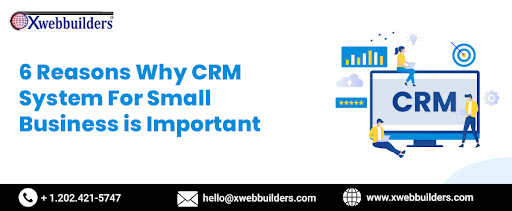
September 01, 2025

CRM stands for “customer relationship management,” a type of software that helps businesses manage, track and organize their relationships with customers. A CRM by our CRM Software Development services in ashburn VA can help you store customer data such as user behavior, how long a customer has been with your business, purchase records, and notes on sales interactions, which you can use to optimize your sales and marketing processes and improve customer service across your organization.
One of the primary benefits of CRM software development is automation, which allows your teams to better manage their resources. Manually managing leads and customer data is a costly process with a high risk of human error, but with a centralized system, your teams can automate menial tasks and focus on strategy.
After all, why waste time manually sharing customer information with others or via email and other tools if you can automatically provide access to that crucial data to all your teams? Your sales, marketing, and support experts can collaborate in a centralized location using up-to-date information, minimizing the risk of error or duplicate data.
Personalization is one of the best ways to enhance the overall customer experience, but to do that, you need to understand your customers and manage every lead individually. This is almost impossible to do manually, but with CRM software made by our CRM Software Development Company in ashburn VA, it can be a straightforward process.
You can use CRM software to store and organize all customer data and create detailed buyer personas that you can optimize on a micro level. This means you can optimize your personas per individual leads to achieve what is known as hyper-personalization.
We mentioned that CRM software allows you to store, share, and organize vast amounts of customer data. But the tool itself is far more than a data storage system. In practice, custom CRM software built by CRM Software Development Agency in ashburn VA allows you to not only store that data, but also use it to create detailed action plans and strategies.
Customers leave huge amounts of personal data online simply by browsing the web and interacting with search engines, websites, and social media platforms. Their data is being collected all over the web, but your CRM can store all that data on a centralized platform automatically. This gives you a comprehensive overview of all your data sources and allows all your teams to work together on putting that data to good use.
Another key benefit of CRM software by a CRM Software Development Company is that it facilitates efficient and effective market segmentation. In turn, this allows you to better personalize your campaigns and develop a deeper understanding of your target demographic.
The data you collect and analyze through your CRM system helps you understand the behavior, aspirations, and goals of your customers so that you can align your sales and marketing processes to their needs. You can feed some of the information into the CRM system manually as you’re developing and nurturing leads, but the CRM will automatically populate the database with information gathered across many digital touchpoints.
Customer churn is inevitable, but good customer service can help minimize the rate at which you lose customers and help you boost retention and CLV (customer lifetime value). While the AI-driven chatbots take care of the menial and repetitive tasks, your customer service agents can focus on enriching the customers’ experience as a whole. They can do this through value-driven messaging, nurturing, and by developing loyalty programs with your sales and marketing experts.
If there is no centralized access to customer data, then you can’t expect your sales, marketing, and support teams to work together seamlessly. In fact, without a CRM system by a CRM Software Development Agency to centralize and organize all your data, you can expect to encounter department silos in your organization.
A CRM (Customer Relationship Management) system is a powerful tool that businesses can utilize to manage and enhance their interactions with customers and prospects. Here are some key points to consider when implementing a CRM system for your business:
1) Centralized Customer Data: A CRM system serves as a centralized hub for storing and organizing customer data. It allows businesses to maintain a comprehensive view of each customer's interactions, purchase history, preferences, and contact information. This enables more personalized and targeted marketing, sales, and customer service efforts.
2) Improved Customer Engagement: With a CRM system, businesses can track and analyze customer interactions across various channels such as email, social media, and phone calls. This data provides valuable insights into customer behavior and preferences, allowing businesses to engage with customers in a more meaningful and personalized manner.
3) Streamlined Sales Processes: CRM systems streamline the sales process by automating tasks such as lead generation, opportunity management, and sales forecasting. Sales teams can efficiently track leads, nurture relationships, and prioritize their efforts based on real-time data and analytics provided by the CRM system.
4) Enhanced Customer Service: A CRM system enables businesses to provide better customer service by facilitating efficient case management, ticket tracking, and resolution workflows. Customer service representatives can access relevant customer information, track interactions, and provide timely and personalized support.
5) Marketing Campaign Management: CRM systems support targeted marketing campaigns by segmenting customer data based on demographics, interests, and buying behavior. This allows businesses to tailor marketing messages, deliver personalized content, and track campaign performance, resulting in more effective and measurable marketing efforts.
6) Collaboration and Communication: CRM systems foster collaboration and communication among teams by providing a centralized platform for sharing customer information, notes, and tasks. This improves internal coordination, facilitates knowledge sharing, and ensures that all team members are aligned in their customer interactions.
7) Data Analysis and Reporting: CRM systems offer robust reporting and analytics capabilities, enabling businesses to gain insights into sales pipelines, customer trends, and overall business performance. This data-driven approach allows for informed decision-making, process improvements, and the identification of growth opportunities.
8) Scalability and Integration: CRM systems are scalable and can adapt to the changing needs and growth of a business. They can integrate with other essential tools and systems such as email marketing platforms, e-commerce platforms, and accounting software, ensuring seamless data flow and process automation.
In conclusion, a CRM system can significantly benefit businesses by centralizing customer data, improving customer engagement, streamlining sales processes, enhancing customer service, enabling targeted marketing campaigns, facilitating collaboration, providing data analysis and reporting capabilities, and ensuring scalability and integration. By leveraging a CRM system, businesses can build stronger customer relationships, increase sales effectiveness, and drive overall business growth.
Businesses of all sizes, from solo freelancers to enterprise-level corporations, can use CRM technology effectively. After all, the key functions of a CRM are organization, centralized task management, marketing automation, and communication, which are important to every business’s success. For more information on the topic, or to avail services of our CRM software development agency in Ashburn VA, visit Xwebbuilders.com .